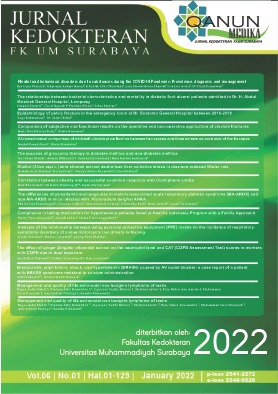Compliance in taking medication for hypertension patients listed at Healthy Indonesia Program with a Family Approach
Abstrak
ABSTRACT
Compliance is the main factor in determining the success of treatment of hypertension and is needed for controlling the prevention of complications so that it is included in one of the Healthy Indonesia Program with a Family Approach (PIS-PK/Program Indonesia Sehat dengan Pendekatan Keluarga) indicators. This research aims to determine the relationship between education level, economic status, and knowledge level with compliance in taking medication. This research was observational analytic with a cross-sectional approach. The respondents in this study were hypertension patients listed on PIS-PK in the Mijen District for the period January-August 2020, which included the inclusion and exclusion criteria of 45 respondents. Primary data were obtained using MMAS-8, HK-LS, and a hypertension management knowledge questionnaire. Technique sampling was used consecutively. Data analysis used the Spearman rank correlation test. In this research can be concluded education level (p= 0.025) with relation coefficient (r=0.334) and economic status (p=0.000) with relation coefficient (r=0.550), level of knowledge about hypertension (p=0.000) with relation coefficient (r = 0.545) and knowledge about hypertension management (p=0.005) with relation coefficient (r = 0.413). The higher level of education, the economic status, the level of knowledge its makes higher the compliance in taking medication for hypertension patients listed on the Healthy Indonesia Program with a Family Approach in the Mijen District.
Keywords : Education, Economic, Knowledge, Compliance
Correspondence : merry.tyas@unimus.ac.id
Artikel teks lengkap
Referensi
Ahda MH. Pengaruh tingkat pendidikan dan dukungan keluarga terhadap tingkat kepatuhan minum obat pada pasien hipertensi di Rumah Sakit Umum Daerah Kajen Kabupaten Pekalongan tahun 2016 [Skripsi]. Fakultas Kedokteran UNIMUS. Semarang. 2016;8-23.
Dahlan S. Statistik untuk kedokteran dan kesehatan edisi 6. Jakarta: Salemba Medika. 2014.
Darker CD, et al. An intervention to promote walking amongst the general population based on an “extended†theory of planned behaviour: a waiting list randomised controlled trial. Psychology & health, 2010, 25(17)1–88.
Haldi T, Pristianty L, Hidayati RI. Hubungan pengetahuan dan sikap dengan kepatuhan minum obat amlodipine di puskesmas arjuno Kota Malang. J Farmasi Komunitas. 2021;8(1). 27-31.
Harijanto W, Rudijanto A, Alamsyah N A. Pengaruh konseling motivational interviewing terhadap kepatuhan minum obat penderita hipertensi. Jurnal Kedokteran Brawijaya. 2015;28(4):354–353.
Ikhwan M, Livana PH, Hermanto. Hubungan faktor pemicu hipertensi dengan kejadian hipertensi. J Kesehatan. 2017;10(2).
Kementrian Kesehatan RI. Hipertensi Si Pembunuh Senyap. Infodatin pusat data dan informasi Kementrian Kesehatan Republik Indonesia [Internet]. 2018. 1–5. Available from: https://pusdatin.kemkes.go.id/resources/download/pusdatin/infodatin/infodatin- hipertensi-si-pembunuh-senyap.pdf
Kemenkes RI. Rekapitulasi IKS. [citied 24 Agustus 2020] Available from: URL: http://dashboard- keluargasehat.kemkes.go.id/index.p hp?kategori=2&pronvinsi=33
Kementrian Kesehatan Republik Indonesia. Permenkes No 39 tahun 2016 Tentang Pedoman Penyelenggaraan Program Indonesia Sehat dengan Pendekatan Keluarga. Kementrian Kesehatan RI.2016.
Kementerian Kesehatan RI. Rekapitulasi indeks keluarga sehat per provinsi di Indonesia tahun 2019 [Internet]. 2020. Available from: http://dashboard- keluargasehat.kemkes.go.id/.
Limbong VA, Rumayar A, Kandou GD. Hubungan pengetahuan dan sikap dengan kejadian hipertensi di wilayah puskesmas Tateli Kabupaten Minahasa. Kesmas J. 2018; 7(4).
Morisky DE, Ang A, Krousel WM, Ward HJ. Predictive validity of a medication adherence measure in an outpatient setting. Journal Clinical Hypertension. 2008;10(5):348–54.
Notoatmojo S. Kesehatan masyarakat ilmu dan seni. Jakarta: Rineka Cipta. 2007.
Notoatmojo S. Pendidikan dan perilaku kesehatan. Jakarta: Rineka Cipta; 2010.
Notoatmodjo S. Ilmu perilaku kesehatan. Jakarta: Rineka Cipta. 2014.
Puspita E. Faktor-faktor yang berhubungan dengan kepatuhan penderita hipertensi dalam menjalani pengobatan [Skripsi]. Fakultas Ilmu Keolahragaan. UNNES. Semarang. 2016.
Pujiyanto P. Faktor sosio ekonomi yang mempengaruhi kepatuhan minum obat antihipertensi. Kesehatan masyarakat National Public Health Journal. 2008;3(3):139.
Ramadhan M. Pengaruh Tingkat Pengetahuan Terhadap Kualitas Hidup Dengan Kepatuhan Penggunaan Obat Sebagai Variabel Antara Pada Pasien Hipertensi di Depo Farmasi Rawat Jalan RS PKU Muhammadiyah Surakarta [Tesis] Surakarta: Universitas Setia Budi; 2016.
Rasajati QP, Raharjo BR, Ningrum DNA. Faktor-faktor yang berhubungan dengan kepatuhan pengobatan pada penderita hipertensi di wilayah kerja Puskesmas Kedungmundu Kota Semarang. Unnes Jurnal of Public Health. 2015;4(3):256–63.
Unger T, Borghi C, Charchar F, et al. 2020 International society of hypertension practice guideline. American Heart Association. 2020;75(6):1334-57.
Penulis

Qanun Medika oleh FK UM Surabaya disebarluaskan di bawah Lisensi Creative Commons Atribusi 4.0 Internasional.
Berdasarkan ciptaan pada http://journal.um-surabaya.ac.id/index.php/qanunmedika.

